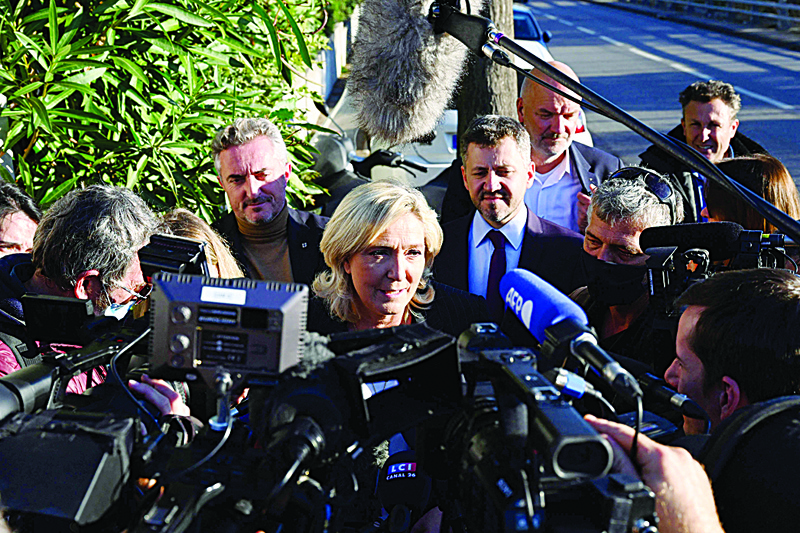 MARSEILLE: Leader of French far-right party Rassemblement National (RN) and candidate for the 2022 French presidential election Marine Le Pen (C) answers journalists' questions after visiting a police station in the northern neighbourhoods of Marseille. - AFP
MARSEILLE: Leader of French far-right party Rassemblement National (RN) and candidate for the 2022 French presidential election Marine Le Pen (C) answers journalists' questions after visiting a police station in the northern neighbourhoods of Marseille. - AFP
MARSEILLE: On a tour of a fine-food trade show, surrounded by cheese and truffles, French far-right leader Marine Le Pen admits that the start of campaigning for next year's presidential election has given her indigestion. "It's been Zemmour for breakfast, lunch and dinner," she complained to AFP after more than an hour and half of sampling everything from throat-burning alcoholic liqueurs to duck-liver pate.
Eric Zemmour, a media pundit and best-selling author whose rhetoric on Muslims and immigrants is more extreme than Le Pen's, has made a dramatic entrance into French politics since September. "It's been incredible. The way he has monopolised the media is absolutely extraordinary," she said during a weekend trip to the southern port of Marseille.
For the first time in early October, polls showed Le Pen failing to qualify for the second round of next April's polls, eclipsed by her new rival whose face was on TV screens and newspaper stands around the country. "When you've got experience you have to let the dust settle and the dust is starting to settle," the 53-year-old said confidently, forecasting that Zemmour's support would be temporary while hers was permanent.
Three separate polls in the last 10 days indicate Zemmour, who has yet to officially declare his candidacy, is indeed losing steam. But the outcome of the duel remains uncertain and observers are unsure how it might effect the final result of an election which President Emmanuel Macron remains the favourite to win. One possibility is that Le Pen and Zemmour eliminate each other by splitting the far-right vote in the first round on April 10. The latest tracker poll last Thursday by OpinionWay showed Macron top on 24-25 percent, Le Pen comfortably in second on 19-21 percent, with Zemmour trailing on 12 percent.
Under France's electoral system, the two candidates who get the most votes in the first round advance to a run-off ballot. Le Pen is convinced that Zemmour will expand the far-right nationalist vote for the second round by attracting traditional right-wing voters who are angry about immigration and crime, as well as abstentionists. "For the people who've supported Zemmour's candidacy, it will be much easier for this electorate to switch to me," she explained, adding that Zemmour "might end up being a stroke of luck". Success in what is her third tilt for one of Europe's most powerful political offices would send shockwaves across the continent.
Zemmour has already helped Le Pen with one of her main goals since she took over the National Front party, now known as the National Rally, from her father Jean-Marie Le Pen in 2011. The divorced mother-of-three has been desperate to portray herself as a more moderate figure and has excluded overt racists and anti-Semites-including her father-from her movement. - AFP

